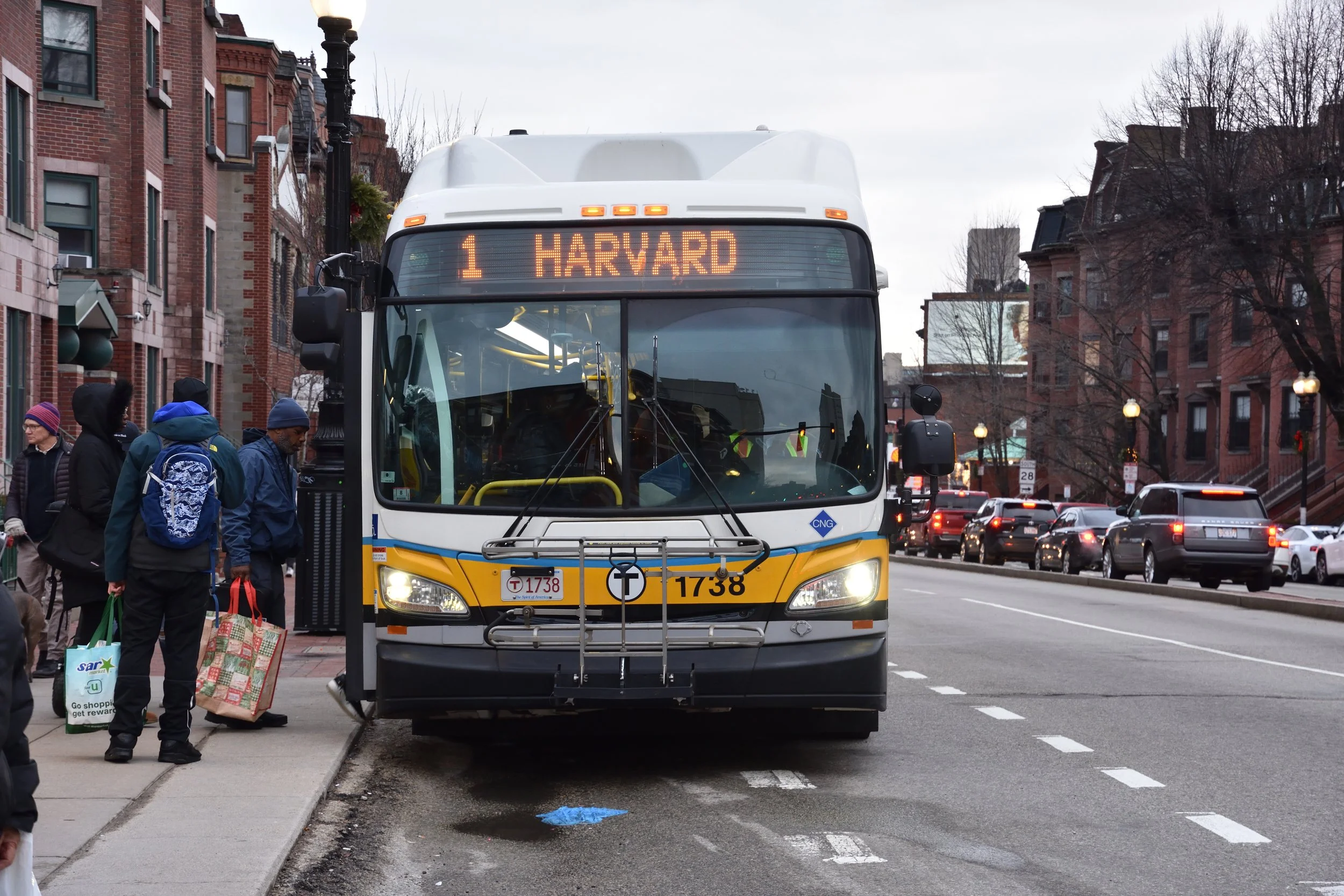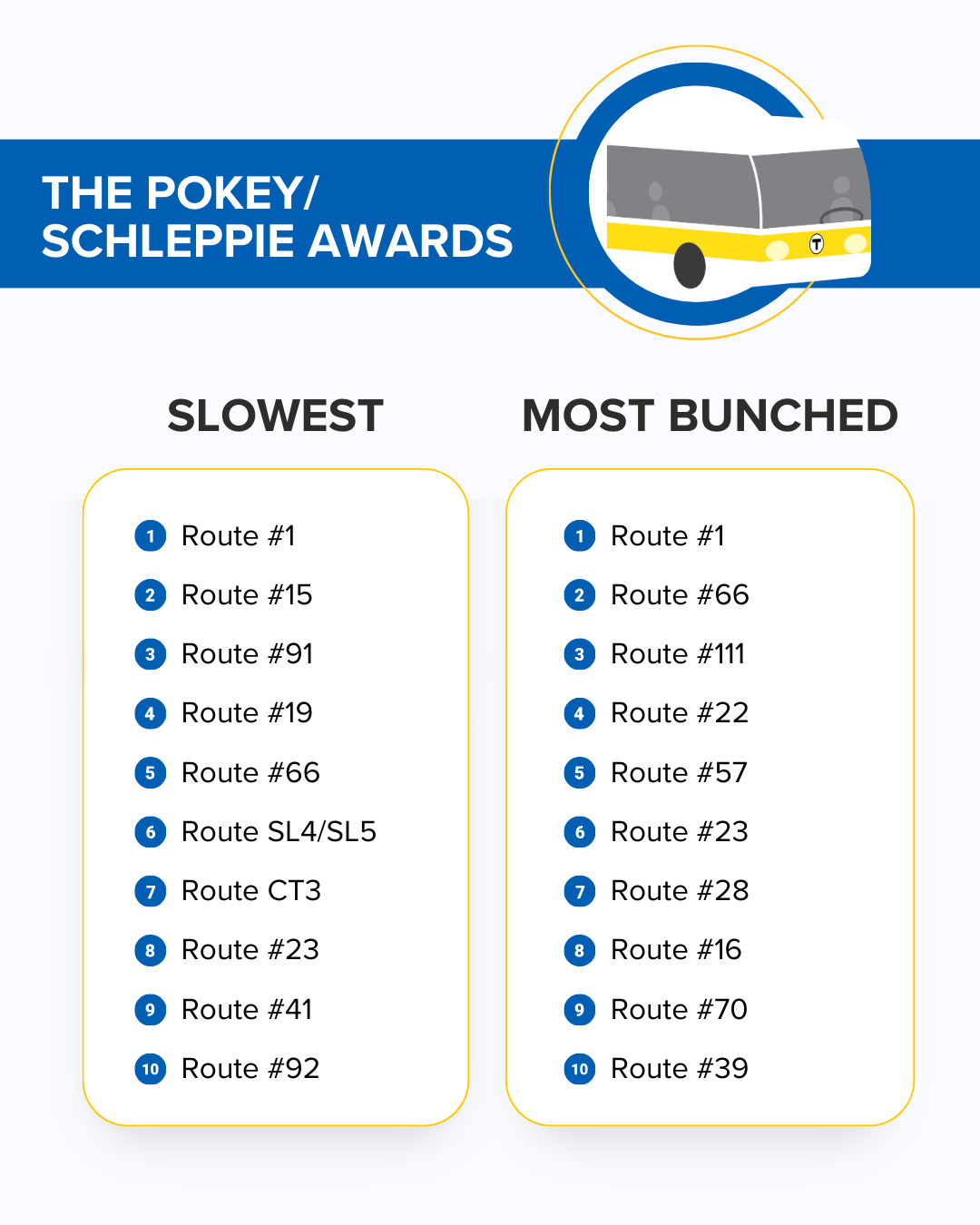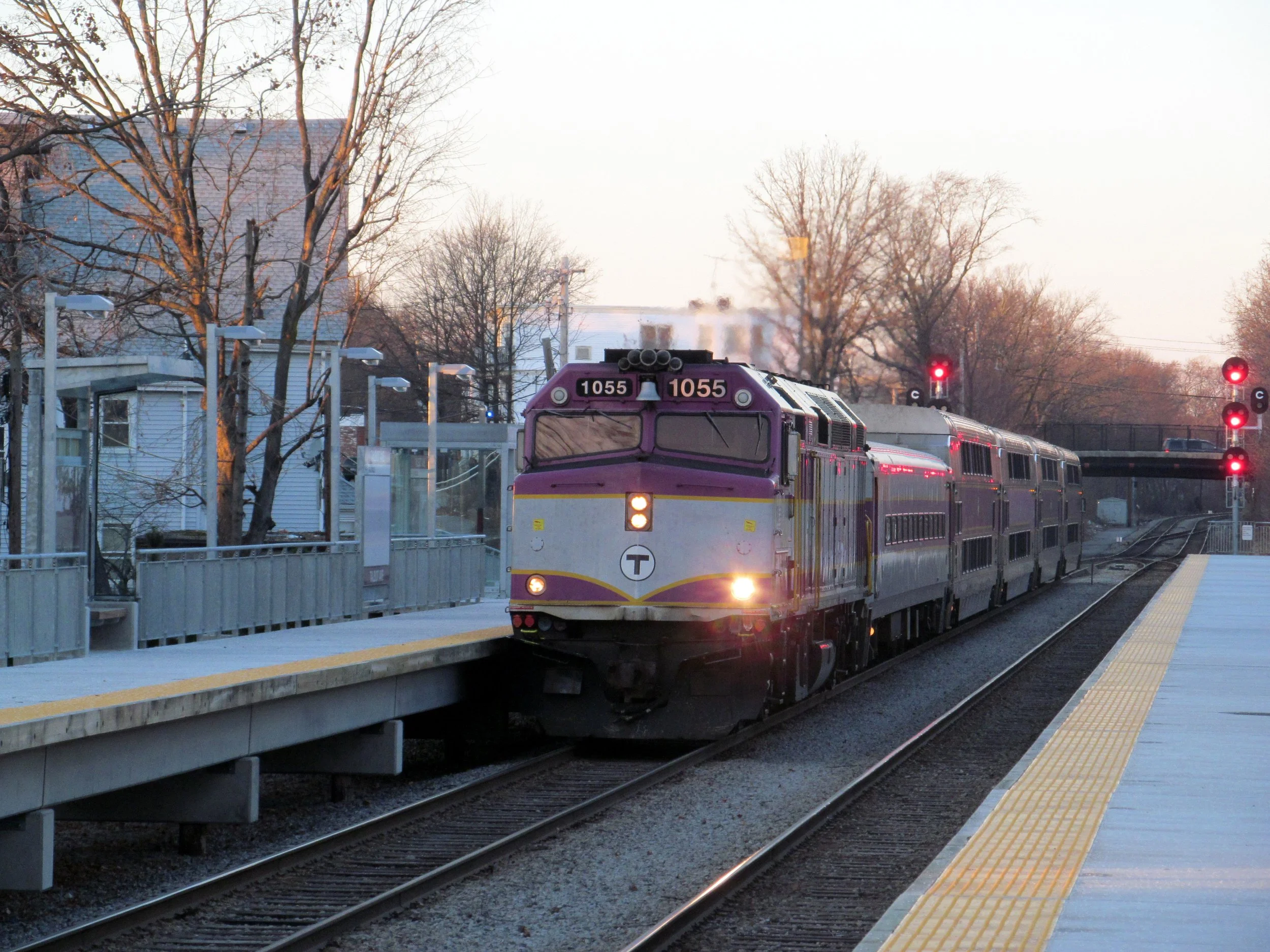
TransitMatters Reveals The MBTA's Slowest And Most Bunched Buses
[The Pokey/Schleppie Awards] identifies the most unreliable routes and suggests bus priority infrastructure implementations, operations modernization, and policy and planning changes to create a better bus network for riders.
BOSTON, April 11, 2024 — The NextGen Bus team at TransitMatters is excited to announce the release of our first Pokey/Schleppie Awards report identifying and analyzing the top 10 slowest (pokey) and top 10 most bunched (schleppie) buses in the MBTA network. Inspired by the original Pokey/Schleppie report from NYPIRG’s Straphangers Campaign, this report identifies the most unreliable routes and suggests bus priority infrastructure implementations, operations modernization, and policy and planning changes to create a better bus network for riders. These proposals include the adoption of more bus lanes (including center-running bus lanes), Transit Signal Priority (TSP), headway management, all-door boarding, automated enforcement, and enhanced circulation planning. In conjunction, these measures can reduce bus bunching, increase speed, and improve rider experience while making the bus a dignified transit option.
TransitMatters recognizes the role other stakeholders play in this process, including various municipalities, the MBTA, community organizations, and in some cases MassDOT, DCR, and elected officials. These stakeholders have begun to lead efforts that prioritize buses, but additional collaboration, cooperation, and coordination are needed between them to see impactful results. Furthermore, improvements to our bus network will not be possible without addressing the MBTA’s financial constraints. A sustainable, dedicated funding source for the MBTA has yet to be identified, posing challenges for getting projects that prioritize buses off the ground. Plans and initiatives for bus improvements can only be valuable to our bus network if funding is available to execute them. The MBTA must be supported rather than shamed to ensure effective improvement in bus reliability.
The goal of this report is to not only confirm riders’ experience, but also to promote collaborative efforts by the MBTA, municipalities, community organizations, and other stakeholders to transform our bus network into the reliable system riders deserve. This report highlights where improvements to our bus network can be most impactful and provides the opportunity for stakeholders to come together and do the necessary work to create a system that riders can rely on. TransitMatters is hopeful that this report will spark the change we hope to see for our bus network. We look forward to being involved and supporting leaders in their endeavors to prioritize buses.
This blog post was written by Katie Calandriello, TransitMatters’ NextGen Bus, Mobility Hubs, and TransitMatters Labs Project Manager and Policy Analyst. For media inquiries, please email media@transitmatters.org or contact kcalandriello@transitmatters.org for your NextGen Bus questions.
###
Photo Credit: James Wang
TransitMatters Director's Public Comment At March 2024 MBTA Board Meeting
“I'm excited to see [the Low Income Fare] program increase access, change lives, and save riders and the Commonwealth money.”
Below is the full transcript of the public comment our Executive Director, Jarred Johnson, wished to present to the MBTA Board on March 28, 2024:
“Madam Secretary, Chair Glynn, General Manager, members of the board and staff. Thank you.
I would like to echo the support for low-income fares. I'm excited to see this program increase access, change lives, and save riders and the Commonwealth money. I hope the agency can find a way to lower premium fares for the Ride. I also want the agency to advocate for long-term funding solutions for low-income fares and the Ride.
I would also like to address the diversions from a communications and mitigation standpoint. The time savings are meaningful and I appreciate the aggressiveness of the schedule. However, we are still not where we need to be with reaching passengers, such that municipalities are supplementing these efforts. It's not even possible to find the schedule online without downloading a PDF.
It is far more important that riders get information sooner than to wait for every “I” to be dotted and “T” crossed. Get information out sooner. The communication and mitigation must improve so the T can break the unvirtuous cycle of lack of information and poor diversion experience, leading folks to drive, and adding to congestion that slows down buses. Ridership must increase and we can't wait for December to see that increase.
To that end, service must be the next priority: from dropped bus trips to the abysmal headway management of the Green Line. Managers need to face accountability for poor service, and staff members need the support and flexibility to have the right incentives to keep better headways and have more realistic schedules. This is an opportunity for the T to be a solution for our growing traffic problems.
Finally, I want to commend the agency and Keolis for the movement on Regional Rail. The proposed Fairmount Line pilot is a huge first step towards electrification and allows us to test technological solutions that can inform the final plan. We look forward to advancing the proposal or evaluating others. Thank you.”
Media Statement: Blue Hill Avenue Center-Running Bus Lane
The Blue Hill Ave dedicated bus lane, along with the project’s other mobility upgrades, is a major advancement essential to supporting historically disinvested communities.
BOSTON, March 5, 2024 — We are pleased that the City of Boston has officially confirmed the transformation of Blue Hill Avenue into a multimodal corridor, equipped with center-running dedicated bus lanes, that improves safety and efficiency for all. Serving more than 37,000 riders each weekday, Blue Hill Ave is a crucial corridor that connects the Roxbury, Dorchester, and Mattapan neighborhoods. Many buses including the 28, 29, and 31 utilize the Blue Hill Ave corridor but often experience delay and unreliability. The 28 bus has the highest ridership in the MBTA network and serves mostly low-income and transit dependent riders, but it experiences severe bus bunching and slowdowns along its route due to the lack of bus priority.
Aging infrastructure along Blue Hill Ave has created safety concerns for drivers, transit users, and pedestrians alike. This investment, with funding from the City of Boston, the federal government, and the MBTA, will improve mobility in Roxbury, Dorchester, and Mattapan. Through the implementation of this bus lane, significant time savings will be had by its thousands of riders, further promoting equity in the MBTA bus network as Black riders spend significantly more time on buses than white riders. The Blue Hill Ave dedicated bus lane, along with the project’s other mobility upgrades, is a major advancement essential to supporting historically disinvested communities.
TransitMatters applauds the City of Boston for its robust community engagement process, which helped shape this project. The modernization of Blue Hill Ave will promote mobility and transform it into a multimodal corridor that prioritizes safety and accessibility for everyone. We're excited to see the additional beautification elements that along with the transportation improvements, will support local businesses and make the corridor more vibrant and livable.
TransitMatters supports implementing bus priority measures, such as center-running dedicated bus lanes, to increase reliability and protect buses as a dignified transit option. The success of this project will improve experiences for those of all modes, bus riders, pedestrians, cyclists, and drivers, and create a safer and more livable corridor in the Roxbury, Dorchester, and Mattapan neighborhoods.
For media inquiries, please e-mail media@transitmatters.org.
###
Photo credit: James Wang
Categories
- Children (1)
- Diversions (1)
- Olympics (1)
- MAPC (2)
- Red–Blue Connector (2)
- Urban Design (3)
- Bus (4)
- Fares (4)
- Late Night Service (4)
- MBTA ROC (4)
- Silver Line (4)
- Snow (5)
- Blue Line (8)
- Emergency (8)
- Orange Line (8)
- Public Comment (8)
- Maintenance (9)
- Operations (9)
- Signage (9)
- Fare Collection (10)
- Labs (11)
- Safety (11)
- Planning (12)
- Communication (14)
- MBCR (14)
- MassDOT (14)
- Green Line (16)
- History & Culture (16)
- Red Line (18)
- MBTA Bus (21)
- Commuter Rail (24)
- Advocacy (26)
- Capital Construction (28)
- Politics (30)
- Podcast (35)
- News (38)
- Media (40)
- Funding (42)
- Statements (50)
- MBTA (57)




